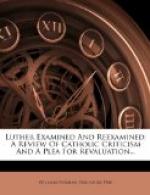2. Luther Hatred.
Catholic writers have found so much to censure in the character and writings of Luther that one is amazed, after reading them, how Luther ever could become regarded as a great and good man. Criminal blindness must have held the eyes, not only of Luther’s associates, but of his entire age, yea, of men for centuries after, if they failed to see Luther’s constitutional baseness. Quite recently a Catholic writer has told the world in one chapter of his book that “the apostate monk of Wittenberg” was possessed of “a violent, despotic, and uncontrolled nature,” that he was “depraved in manners and in speech.” He speaks of Luther’s “ungovernable transports, riotous proceedings, angry conflicts, and intemperate controversies,” of Luther’s “contempt of all the accepted forms of human right and all authority, human and divine,” of “his unscrupulous mendacity,” “his perverse principles,” “his wild pronouncements.” He calls Luther “a lawless one,” “one of the most intolerant of men,” “a revolutionist, not a reformer.” He says that Luther “attempted reformation and ended in deformation.” He charges Luther with having written and preached “not for, but against good works,” with having assumed rights to himself in the matter of liberty of conscience which “he unhesitatingly and imperiously denied to all who differed from him,” with having “rent asunder the unity of the Church,” with having “disgraced the Church by a notoriously wicked and scandalous life,” with having “declared it to be the right of every man to interpret the Bible to his own individual conception,” with “one day proclaiming the binding force of the Ten Commandments and the next declaring they were not obligatory on Christian observance,” with having “reviled and hated and cursed the Church of his fathers.”
These opprobrious remarks are only a part of the vileness of which the writer has delivered himself in his first chapter. His whole book bristles with assertions of Luther’s inveterate badness. This coarse and crooked Luther, we are told, is the real Luther, the genuine article. The Luther of history is only a Protestant fiction. Protestants like Prof. Seeberg of Berlin, and others, who have criticized Luther, are introduced as witnesses for the Catholic allegation that Luther was a thoroughly bad man. We should like to ascertain the feelings of these Protestants when they are informed what use has been made of their remarks about Luther. Some of them may yet let the world know what they think of the attempt to make them the squires of such knights errant as Denifle and Grisar.




